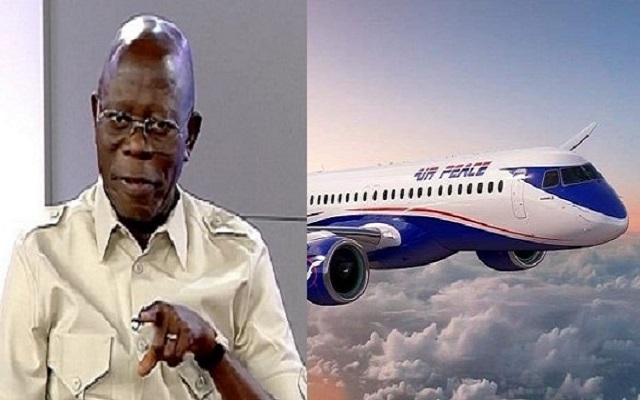By Sylvester Ike Onwudiwe, Esq.
When a sitting Senator of the Federal Republic mounts a baggage conveyor belt in protest at a commercial airline, blocks a public terminal, and allegedly obstructs airport staff, what is at stake is not merely an issue of missed flights—but the erosion of the very principles that distinguish a lawful democracy from an entitled feudal theatre.
The recent confrontation between Senator Adams Oshiomhole and Air Peace Airlines at Lagos’ Murtala Muhammed Airport is far more than a celebrity outburst. It is a juridical mirror—one that reflects the tensions between lawmaking and lawbreaking, privilege and protocol, and between public duty and personal entitlement.
The Incident as Alleged
On the morning of June 11th, Senator Oshiomhole reportedly arrived late for his Air Peace flight to Abuja. Denied boarding, the senator is alleged to have taken matters into his own hands—literally—by climbing onto a restricted baggage conveyor belt, disrupting terminal operations, and directly engaging airline staff in a scene described by onlookers as disorderly and forceful.
Video evidence shows a commotion around the check-in area. Reports suggest he was accompanied by aides who may have helped block terminal exits, impeding passenger movement. These are not ordinary infractions—they are breaches, if substantiated, that cut to the heart of aviation security and civil decorum.
The Lawmaker’s Oath and Duty
Senators are not above the law. They are, in fact, its most public stewards. The sanctity of the lawmaking chamber is not in its marble walls but in the example set by those elected to legislate. To see a lawmaker allegedly circumvent rules laid down for public safety—and in the process disrupt the peace of an international terminal—is a contradiction so sharp it pierces the very spirit of public trust.
The burden of public office is self-restraint. What a lawmaker cannot resolve by petition, he ought not to escalate by performance. A grievance over boarding protocol must be addressed through proper channels—not through theatrical disruption or unlicensed interference with airport infrastructure.
Air Peace and Passenger Rights
Air Peace, as a licensed operator, is governed by aviation standards that are neither whimsical nor selective. The rules on check-in and boarding closure are designed not for convenience but for security and coordination. No airline—however patriotic or profit-driven—can afford to gamble with the timing and safety procedures required for takeoff.
If, as the airline claims, its operations were disrupted, staff harassed, and passengers delayed by the Senator’s actions, then the airline and those passengers may have grounds for redress in civil proceedings. Tortious interference with business, nuisance, and disturbance of the peace are not idle complaints—they are actionable claims.
Public Safety and Legal Precedent
Let us be clear: a baggage conveyor belt is not a soapbox. It is a mechanized component of aviation logistics governed by strict health and safety codes. Mounting it—whether in protest or panic—is a threat to one’s own safety, that of others, and the airport’s functional integrity.
Were this action carried out by an ordinary citizen, arrest and prosecution would likely have followed. That it was allegedly committed by a senator underscores a dangerous precedent: that status may shield one from consequence.
The use of security aides to physically obstruct public space, if confirmed, raises further alarms about the misuse of public resources for personal confrontation. It suggests a transformation of state-funded protection into tools of intimidation and private enforcement.
The Travelling Public Must Not Be Held Hostage
Passengers affected by this disruption—whether delayed, blocked, or denied services—deserve more than an apology. They deserve accountability. Public infrastructure cannot become a battlefield for ego or an arena for status combat. The civil right to move freely, without intimidation or disorder, must be safeguarded even at 6:30 a.m.
This incident, if not checked, will deepen public cynicism about the “two Nigerias”—one where rules apply, and one where they do not. If a mass action arises, whether through a class action suit or coordinated petitions, it will be fully justified within democratic parameters.
Regulatory and Institutional Responses
It is essential now that:
- FAAN and NCAA initiate an independent, transparent investigation into the event, including the release of CCTV footage under lawful authority.
- Air Peace ensures its staff are protected from retaliation, and reviews its protocols for managing high-profile disruptions.
- The National Assembly Ethics Committee evaluates whether this behaviour contravenes the ethical code binding on senators.
- Security protocols are revisited to ensure VIPs cannot compromise the very safety architecture they rely upon.
Conclusion: The Rule of Law Must Not Be Optional
This is not a tale about one man missing a flight. It is the story of how we, as a nation, treat power and protocol. When a senator behaves as if the rules do not apply, it is not a personal failing—it is an institutional crisis.
We must insist that every public figure be bound by the same codes that bind us all. The conveyor belt of privilege must not become the highway to impunity.
Let us, as citizens, as professionals, and as observers, restore the expectation that power is exercised with humility, and that the higher one climbs, the deeper their duty to law and order.
Sylvester I. Onwudiwe, Esq., is a Barrister and Solicitor of the Supreme Court of Nigeria and principal legal consultant to several international and local institutions. He writes on law, governance, and social equity for Igbofacts.com.










